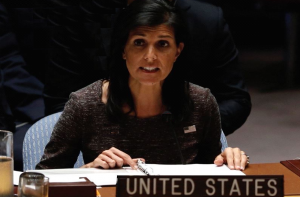
U.S. State Department backs Nikki Haley’s remarks, showing concern of Palestinian efforts to exploit UN leadership positions for a de facto appearance, or even recognition as an independent state, when if fact they are not.
By Reuters and Israel Hayom Staff
U.S. Ambassador to the U.N. Nikki Haley on Tuesday took some lawmakers by surprise when she seemed to assert that the Trump administration’s policy was to prevent any Palestinians from serving in U.N. positions unless and until the U.S. recognizes an independent Palestinian state.
Haley made the comments during two days of testimony before a pair of committees in the House of Representatives.

AMBASSADOR NIKKI HALEY inspects preserved section of a Hamas attack tunnel beneath Israel that was made to infiltrate into Israeli civilian towns, but uncovered by the IDF and subsequently destroyed. – Photo: MATTY STERN/US EMBASSY TEL AVIV
Earlier this year, the U.S. blocked the appointment of Salam Fayyad, the former Palestinian prime minister, to lead the U.N.’s political mission in Libya. Though Fayyad is a well-respected international figure and the post was unrelated to the Israeli-Palestinian conflict, the U.S. described it as an act of support for Israel.
“If we don’t recognize Palestine as a state, we needed to acknowledge, also, that we could not sit there and put a Palestinian forward until the U.S. changed its determinations on that front,” Haley said.
On Wednesday, the U.S. State Department voiced support of Haley’s remarks, tying the move to block Fayyad’s appointment to U.S. concerns about “Palestinians’ efforts to achieve recognition of Palestine as an independent state through the United Nations system.”
Still, the U.S. wouldn’t say whether that policy would apply in the future to any Palestinian who might be tapped for any U.N. job, or whether it would also force the U.S. to block the appointment of diplomats associated with other entities not recognized by the U.N. as full-fledged independent nations, such as the Vatican.
“This situation is unique and should be viewed through the lens of the broader Israeli-Palestinian conflict,” said Edgar Vasquez, a spokesman for the State Department’s Near Eastern Affairs Bureau.
View original Israel Hayom publication at:
http://www.israelhayom.com/site/newsletter_article.php?id=43463






 Israeli New Shekel Exchange Rate
Israeli New Shekel Exchange Rate